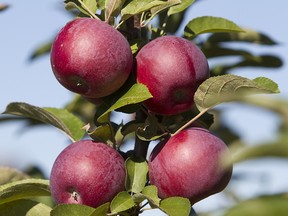This report shows that the cultivation of various crops could benefit from climate change, extending the growing season.
Article Author:

La Presse Canadienne
Stéphane Blais

It could also lead to certain benefits, and those within the industry who recognize that they need to adapt would benefit the most, said climate change in this state. report concludes.
Ouranos The Quebec chapter of the 127-page report “Canada in a Changing Climate: A Regional Perspective” produced by the Ouranos study group states: is explained in A “state of knowledge” about the impacts of climate change in the state.
The report noted that the cultivation of various crops could benefit from climate change, particularly in the form of longer growing seasons for soybeans and corn, two staples of agriculture in Quebec. I am discovering something. Those crops could also move further north as temperatures rise, according to the report.
The same predictions apply to apple cultivation. Apple plantations are confined to southern Quebec, but may expand into "areas of potential new viticultural climates such as southern Utahué and the St. Lawrence Valley."
The report said such changes could "increase Quebec's competitiveness for these same agricultural products."
On the other hand, certain other crops such as canola, barley, and wheat, which are suited to cooler climates, may suffer in warmer temperatures.
Winter mortality in perennial crops that can remain productive for years can be increased not only by snowmelt and frequent rains during the winter, but also by warm autumns. Alfalfa and orchard grass used in cattle feed are examples.
Climate change may also facilitate the spread of certain crop diseases, weeds, and invasive species such as roundworms and soybean cysts, which were first detected in Quebec in 2013. There is A project that increased pressure from invasive species could lead to increased use of pesticides, with consequent impacts on the environment and human health.
A clear disadvantage of climate change is already being seen in the yields of certain crops. In the Basse-Saint-Laurent region, the crop of potatoes and hay was below average in 2017-2018 due to prolonged drought.
The report found that water shortages could become more frequent and affect the nutritional value of crops. is also harmful and can affect livestock weight gain, milk and egg production, and the animals' own health.
-

Killer Heat: A Hotter, Deadlier Summer Burns into Montreal's Future
-

Alison Haynes: The climate crisis is here. what are we doing about it?

Sign up for daily newsletters from the Montreal Gazette, a division of the Postmedia Network. Receive Headline News Inc.
Thank you for registering.
Sending welcome email. If you don't see it, please check your spam folder.
The next issue of the Montreal Gazette Headline News is coming soon.


